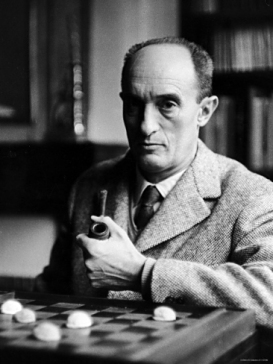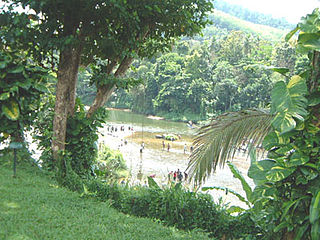Related Research Articles

The Bridge on the River Kwai is a 1957 epic war film directed by David Lean and based on the 1952 novel written by Pierre Boulle. Although the film uses the historical setting of the construction of the Burma Railway in 1942–1943, the plot and characters of Boulle's novel and the screenplay are almost entirely fictional. The cast includes William Holden, Alec Guinness, Jack Hawkins, and Sessue Hayakawa.

Sir David Lean was an English film director, producer, screenwriter and editor. Widely considered one of the most important figures in cinema, Lean directed the large-scale epics The Bridge on the River Kwai (1957), Lawrence of Arabia (1962), Doctor Zhivago (1965), and A Passage to India (1984). He also directed the film adaptations of two Charles Dickens novels, Great Expectations (1946) and Oliver Twist (1948), as well as the romantic drama Brief Encounter (1945).

Pierre François Marie Louis Boulle was a French author. He is best known for two works, The Bridge over the River Kwai (1952) and Planet of the Apes (1963), that were both made into award-winning films.

Samuel P. Spiegel was an American independent film producer born in the Galician area of Austria-Hungary. Financially responsible for some of the most critically acclaimed motion pictures of the 20th century, Spiegel produced films that won the Academy Award for Best Picture three times, a Hollywood first for a sole independent producer.

Kitulgala is a small town in the west of Sri Lanka. The Academy Award-winning The Bridge on the River Kwai was filmed on the Kelani River near Kitulgala, although nothing remains now except the concrete foundations for the bridge. Kitulgala is also a base for white-water rafting, which starts a few kilometres upstream and also popular as a location for adventure based training programs.

Cecil André Mesritz, known professionally as André Morell, was an English actor. He appeared frequently in theatre, film and on television from the 1930s to the 1970s. His best known screen roles were as Professor Bernard Quatermass in the BBC Television serial Quatermass and the Pit (1958–59), and as Doctor Watson in the Hammer Film Productions version of The Hound of the Baskervilles (1959).
Michael Wilson was an American screenwriter.

Carl Foreman, CBE was an American screenwriter and film producer who wrote the award-winning films The Bridge on the River Kwai and High Noon, among others. He was one of the screenwriters who were blacklisted in Hollywood in the 1950s because of their suspected communist sympathy or membership in the Communist Party.

The Bridge over the River Kwai is a novel by the French novelist Pierre Boulle, published in French in 1952 and English translation by Xan Fielding in 1954. The story is fictional but uses the construction of the Burma Railway, in 1942–1943, as its historical setting, and is partly based on Pierre Boulle's own life experience working in Malaysia rubber plantations and later working for allied forces in Singapore and Indochina during World War II. The novel deals with the plight of World War II British prisoners of war forced by the Imperial Japanese Army to build a bridge for the "Death Railway", so named because of the large number of prisoners and conscripts who died during its construction. The novel won France's Prix Sainte-Beuve in 1952.
Peter Taylor was an English film editor with more than 30 film credits. Perhaps his best remembered contribution is the editing of the 1957 film The Bridge on the River Kwai.
The 15th Golden Globe Awards, honoring the best in film for 1957 films, were held on February 22, 1958.
The 29th National Board of Review Awards were announced in late December, 1957.

Chandran Rutnam is a Sri Lankan filmmaker and entrepreneur.
The 11th British Academy Film Awards, given by the British Academy of Film and Television Arts, were held on 6 March 1958, to honor the best national and foreign films of 1957.

The following is a filmography of David Lean, whose body of work in the film industry spanned the period from 1930 to 1984. This list includes the release year of the film, the role(s) Lean had in the production of each film, and additional notes such as awards and nominations. Lean directed 17 feature films in total. Lean often directed the large-scale epics The Bridge on the River Kwai (1957), Lawrence of Arabia (1962), Doctor Zhivago (1965), and A Passage to India (1984). He also directed two adaptations of Charles Dickens novels, Great Expectations (1946) and Oliver Twist (1948), as well as the romantic drama Brief Encounter (1945).

Sir Alec Guinness was an English actor. After an early career on the stage, Guinness was featured in several of the Ealing comedies, including Kind Hearts and Coronets (1949), in which he played eight different characters, The Lavender Hill Mob (1951), for which he received his first Academy Award nomination, and The Ladykillers (1955). He collaborated six times with director David Lean: Herbert Pocket in Great Expectations (1946), Fagin in Oliver Twist (1948), Col. Nicholson in The Bridge on the River Kwai (1957), for which he won both the Academy Award for Best Actor and the BAFTA Award for Best Actor, Prince Faisal in Lawrence of Arabia (1962), General Yevgraf Zhivago in Doctor Zhivago (1965), and Professor Godbole in A Passage to India (1984). In 1970, he played Jacob Marley's ghost in Ronald Neame's Scrooge. He also portrayed Obi-Wan Kenobi in George Lucas's original Star Wars trilogy; for the original 1977 film, he was nominated for Best Supporting Actor at the 50th Academy Awards.
Donald M. Ashton was an Academy Award-nominated and BAFTA-winning English art director most noted for his work on such films as Billy Budd (1962), The Bridge on the River Kwai (1957), Oh! What a Lovely War (1969) and Young Winston (1972).
References
- ↑ Weiler, A. H. (31 December 1957). "'RIVER KWAI' WINS 3 CRITICS AWARDS; Winners of the New York Film Critics' Awards". The New York Times. Retrieved 29 December 2017.